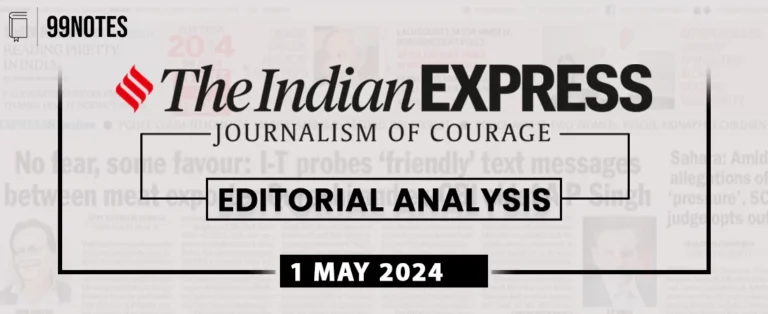6 December 2024 : The Hindu Editorial Analysis
1. States and the challenge before the Finance Commission
(Source – The Hindu, International Edition – Page No. – 8)
| Context |
|
Overview of the Commission’s Mandate
- The Sixteenth Finance Commission, chaired by Arvind Panagariya, was recently hosted by the Government of Tamil Nadu.
- This Commission is tasked with addressing critical fiscal challenges and ensuring a fair relationship between States and the Union.
- Its decisions will significantly influence India’s fiscal policies for the next five years and shape the country’s long-term economic trajectory.
Opportunities Arising from Global Changes
- Global shifts in economic trends, including “friendshoring” and “reshoring,” are reshaping international trade and investment.
- These trends present India with a unique opportunity to enhance its economic prospects.
- The Finance Commission’s challenge is to balance equitable redistribution of resources while encouraging growth in high-performing States like Tamil Nadu.
Challenges in Resource Distribution
- Since the establishment of the first Finance Commission in 1951, there has been a consistent attempt to redistribute resources equitably among States.
- However, discrepancies have remained between the Commission’s declared goals and actual outcomes.
- The Fifteenth Finance Commission’s decision to allocate 41% of the divisible pool to States resulted in only 33.16% effective devolution due to the Union’s increasing reliance on cess and surcharges, which hindered devolution.
Increasing State Share and Incentivizing Performance
- States, which manage substantial developmental expenditures, should receive a larger share of the gross central taxes—suggested to be around 50%.
- This would grant States greater fiscal autonomy, enabling them to fund and implement schemes that cater to local needs.
- The current policy of horizontal devolution has limited results in driving growth, and a more balanced approach is necessary to allow both less-developed and high-performing States to thrive.
Challenges in Progressive States
- States like Tamil Nadu, Maharashtra face unique challenges, such as an aging population and increasing urbanisation.
- Tamil Nadu’s aging demographic limits its capacity to generate consumption-based tax revenue, while incurring the costs of supporting an older population rise.
The Commission’s Broader Role
- The Finance Commission’s mandate is not just about fiscal arithmetic but about fostering a future where every State contributes to and benefits from national progress.
- The Commission’s decisions will have far-reaching impacts, including in sectors like manufacturing, urbanisation, and climate resilience, shaping India’s potential as a leading global economy.

| Sixteenth Finance Commission: |
|
Constituted: December 31, 2023 Chairman: Dr. Arvind Panagariya (former Vice-Chairman of NITI Aayog) Purpose: To recommend how India’s tax revenue should be shared between the central government and the states. Term: 5 years (starting April 1, 2026) Key Considerations: Fiscal stability, economic growth, and equity among states. Previous Commission: The 15th Finance Commission’s recommendations are in effect until March 31, 2026. Important Task: Determining the principles for giving financial aid to states from India’s Consolidated Fund. Additional Role: Suggesting measures to increase the resources of the Consolidated Fund to support local governments (Panchayats and Municipalities). Current Status: The Commission is in the process of gathering information and conducting consultations with various stakeholders. |
| PYQ: How have the recommendations of the 14th Finance Commission of India enabled the States to improve their fiscal position? (150 words/10m) (UPSC CSE (M) GS-2 2021) |
| Practice Question: Critically analyze the role of the Sixteenth Finance Commission in addressing fiscal disparities between the Union and States. How should resource allocation be restructured to meet the emerging economic challenges? (250 Words /15 marks) |
2. A three-nation visit as a foray into summit diplomacy
(Source – The Hindu, International Edition – Page No. – 8)
| Context |
|
Highlights of Prime Minister Narendra Modi’s Visit to Nigeria, Brazil, and Guyana
Nigeria: The First Leg
- Prime Minister Modi’s visit to Nigeria was a full-scale state visit, marking the importance of Africa’s most populous nation and its growing international influence.
- Nigeria is a significant partner in India’s development assistance programs, and the two countries identified new areas for collaboration, such as agriculture, renewable energy, and digital transformation.
- The visit led to the signing of three MoUs, and both sides renewed their commitment to combat terrorism and extremism.
G-20 Summit in Brazil: The Centrepiece
- Prime Minister Modi attended the 19th G-20 summit in Rio de Janeiro, which focused on social inclusion, sustainable development, and global governance reform.
- The summit launched the Global Alliance against Hunger and Poverty, with an emphasis on mobilizing finance and knowledge sharing.
- Discussions also included sustainable development and climate finance, though limited progress was made.
- Leaders also addressed multilateral development bank reform and the importance of peaceful resolutions to conflicts in Europe and West Asia.
Guyana: The Wrap-up
- The final leg of the visit was to Guyana, a small Caribbean nation with a significant Indian-origin population and vital energy resources.
- The Prime Minister’s visit aimed to expand cooperation in energy, defense, digital collaboration, education, and food security.
Significance of the Visit and Potential for Relations with These Countries
Strengthening Bilateral Ties
- India’s engagement with Nigeria, Brazil, and Guyana is pivotal in broadening India’s influence across Africa, Latin America, and the Caribbean.
- The visit helped India build stronger relationships with emerging economies, enhancing trade, investment, and cultural exchange.
Nigeria: Key Collaborations
- Nigeria’s growing stature in global affairs positions it as a valuable partner for India in Africa.
- There is potential for expanding trade, investment, and cooperation in energy, agriculture, and technology.
- However, bureaucratic delays may hinder swift implementation of agreements.
Brazil: Global South Leadership
- Brazil’s leadership in the G-20 strengthens India’s role in representing the Global South.
- India’s involvement in discussions on sustainable development, hunger, and poverty reflects its commitment to global economic stability.
- India must focus on ensuring G-20 commitments are implemented effectively.
Guyana: Caribbean Outreach
- India’s cooperation with Guyana focuses on key sectors like energy, defense, and food security.
- Guyana’s importance is amplified by its energy resources and strategic location within CARICOM.
- Continued efforts in strengthening trade and regional cooperation are necessary for sustained engagement.
Challenges and Way Forward
- Bureaucratic delays in Nigeria may slow down the pace of cooperation.
- While India has made strides in fostering bilateral ties, challenges remain in aligning priorities with local contexts and ensuring efficient implementation of agreements.
- Strengthening diplomatic channels and enhancing people-to-people ties will be crucial in further solidifying India’s position in these regions.
| Practice Question: Discuss the significance of the Prime Minister’s visit to Nigeria, Brazil, and Guyana in recent times. How do such diplomatic engagements contribute to India’s foreign policy objectives in Africa, Latin America, and the Caribbean? (150 Words /10 marks) |


